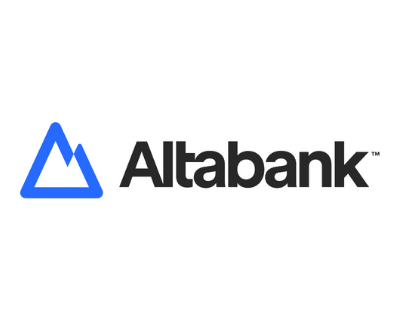The growing differences between ALTA and its largest shareholder group may lead to changes in Utah’s oldest public community bank
Marital separation due to differences in philosophy may not be fun for the participants, even if the more high-profile separations can make for titillating fare in gossip journals and on broadcast entertainment channels.
Unfortunately, there are enough publicly visible signs to suggest that relations between Altabancorp (NASDAQ:ALTA) and its largest shareholder group are significantly strained over the future of Utah’s largest community bank.
Friendly Beginnings: Clifford and Orville
The story begins in 1951 when the then General Manager of People’s Bank of American Fork, Clifford Young, Sr., invited local businessman, Orville Gunther, to join the bank’s Board of Directors.
Clifford had served as the bank’s top executive since 1913 after it was founded, an institution where much of its early business was serving the banking needs of sheep farmers in Utah County.
Some 30 years younger than Clifford, Orville was a native Utah County man who had started his career as a teacher at Lehi High School before he took over the family sheet metal business following his father’s untimely death from an accident.
In the ensuing decade after his appointment to the bank Board, Orville was also elected three times to serve as a State Representative in the Utah legislature, before he was appointed to be the Chairman of the Utah Tax Commission by then Governor, George Dewey Clyde.
At the age of 50, Orville became president of the bank in 1962 after he purchased the ownership position in the bank previously held by Clifford’s son, Clifford Jr.
Orville’s oldest son, Dale, joined his father in the banking business when the two of them purchased additional shares of the bank from Clifford’s daughters in 1971 following their father’s death.
With this purchase the Gunther family became the largest shareholders of the then renamed Bank of American Fork, holding over 50% of its total outstanding shares. And it was at this time that Dale was invited to join its Board of Directors.
Growth, Going Public, and Continued Gunther Involvement
The growth of Bank of American Fork paralleled the growth of Utah County during the 1970s through the 1990s, with branches opened in Alpine, Highland, Orem, Lehi, Pleasant Grove, and Spanish Fork. And in 1998, People’s Utah Bancorp was formed as the holding company for Bank of American Fork.
The new millennium brought continued growth, both organic and via acquisitions, as Bank of American Fork opened full-service branches in Draper, Sandy, Murray, Riverton, Saratoga Springs, and Layton.
While Dale joined the bank’s Board in 1971 (a role he filled for 49 years, including a multi-year stint as its Vice Chairman), he was not an officer of the bank until he was asked to become vice president in 1982 and then president in 1988. In total, Dale served as president for 17 years until his retirement in 2005.
Dale’s father, Orville, passed away two years later in 2007 at the age of 95, having served in many roles with Bank of American Fork (and its predecessor and successor companies), including President, Board member, and Chairman, while also being one of its largest individual shareholders.
In the past decade, a lot of change has happened for what had once been a hometown bank serving sheep farmers, including
- A 2013 merger with Lewiston Bancorp (the bank holding company for Lewiston State Bank);
- An Initial Public Offering in 2015 for the parent company on the NASDAQ Stock Exchange, an IPO that raised $36 million and valued then-named People’s Utah Bancorp at $256MM. {NOTE: This IPO lowered the Gunther family’s ownership position in the bank to approximately 33%.};
- The 2017 acquisition of seven Utah-based branches of Banner Bank;
- The 2017 acquisition of Town & Country Bank in St. George; and
- The 2019/2020 rebranding of People’s Utah Bancorp as Altabank, with all bank branches being renamed Altabank, and the change of the NASDAQ stock symbol to “ALTA.”
Over a nearly 70-year period, four generations of the Gunther family have had varying roles with the now-named Altabancorp, ranging from shareholders to senior executive positions, and up to Chairman of the Board.
My Interest in Altabank and this Unfolding Story
For the record, I’ve been a big fan of Altabank ever since my wife and I opened a family checking account through the Draper branch of Bank of American Fork when it was based in a hole-in-the-wall strip mall location on 12300 South. However, we soon learned that the built-in friendliness and courteous-ness we found from the employees of Bank of American Fork (now Altabank) was genuine and helpful, more so that I had ever experienced previously with a financial institution.
I even got to know its now former VP of Marketing, and we interacted occasionally as peers in the marketing profession.
Naturally, I’ve also watched with interest as the company has gone through various branding changes and marketing campaigns over the years, including the official re-branding to Altabank in 2019.
So I was intrigued when I saw the headline a week ago Tuesday of a news release from the company that read:
Altabancorp Board Confirms Receipt of Letter From Gunther Family 13D Group.
{NOTE: By way of background, I’ve spent over 90% of my career working with pre- and post-IPO companies — in other words, firms where you can buy shares of the companies on a stock market today (or in the future), once said shares are publicly listed. As a result, I know that the term 13D in the news release headline referred to Form 13-D, a legal document that any individual or group owning more than 5% of the shares of a publicly traded company must file with the U.S. Securities and Exchange Commission once they hit that 5% threshold or if anything significant has occurred regarding the stock ownership position. And without being an attorney, I feel I know enough about Securities Law to be pretty “dangerous” from an Investor Relations standpoint.}
Anyway … The Altabancorp news release referred to a Form 13-D filed by the Gunther Family Group in connection with a formal letter it had sent to the bank’s Board of Directors on Jan. 13, 2021.
As I dug into this 13-D filing, the attached Gunther Family Letter to the Board of Directors, a separate 13-D filing by the Gunther family in June 2020, and the Altabancorp news release, something became quite clear to me:
In spite of close to 70 years of Gunther family involvement as management, leadership, and significant shareholders of Altabancorp (in its various iterations), a break of some sort had occurred between the family and the bank.
In fact, I found the language used by both parties in these documents to be quite telling.
Case in point, the Gunther Family Letter attached to its 13-D Filing of January 13 used such language as
- “rejected our requests to meet with the full board”
- “we have seen no discernable action in response to our concerns”
- “we are not confident that our concerns are being given the accord we believe is due a group of shareholders who together own more than 30% of Altabancorp’s common stock”
- (Bank leadership is not) “nurturing an internal culture that promotes the fulfillment of employees’ careers and that fosters their loyalties to the organization”
- “We believe that this culture has been damaged, as evidenced by reports of lost employees and low morale among the remaining workforce.”
- “… we have lost the fundamental bond which we have enjoyed with the organization over the years”
And after discounting the short-term benefits of Covid-motivated government relief/stimulus programs, the letter also states:
- “Altabancorp’s organic growth is anemic,
- “its capital deployed inefficiently, and
- “its potential limited.”
The Letter then closes with this:
“… we believe … it is imperative that the board of directors conduct a full review of Altabancorp’s strategic alternatives and quantify these options as to their value to shareholders. Such a review may lead you to conclude that partnering with another larger organization may be the best way to ensure the realization of Altabancorp’s value as a franchise as well as providing a better set of opportunities to our employees, customers and communities.”
Phew!
For its part, while acknowledging receipt of the Gunther Family Letter attached to the 13-D filing of Jan. 13th, the Altabancorp News Release of January 19 includes the following points:
- “We have retained a renowned leadership development and culture change management company to help us strengthen and build a unique culture of commitment, accomplishment, and accountability as we continue to transform Altabank™ from a local community bank to a regional community bank that caters to small-to-medium sized businesses, their principals, and their employees.” {Emphasis added by me.}
- “we are consistently achieving above peer returns”
- “aggressively grow organically”
- “compete for mergers and acquisitions”
- And twice the release uses the phrase “fortress balance sheet”
In other words, by my reasoning, the Altabancorp news release does little to address most of the specific concerns raised in the Gunther Family Letter, but instead focuses on what the bank sees as its successes.
After reviewing these documents, and conducting additional research, I reached out to Dale Gunther to see if he would share with me additional details about the concerns he and the Gunther Family Group have with the current direction and management of Altabancorp.
We spoke on January 22 for about an hour and have spoken several times since then for shorter, clarifying conversations.
{NOTE: I do not have any financial standing in Altabancorp’s securities, nor do I have any financial engagement with any member of the Gunther Family Group or any other party that could benefit from this article.}
One of the themes that came up numerous times during my calls with Dale was the change of culture within the bank from where it had been for many, many years.
For example, he referred in our first visit to the book Ten Great Souls I Want to Meet in Heaven, by Brad Wilcox, who quoted a Chinese sage as saying:
“You cause people to grow by pouring rain upon them like plants.”
“That’s been my philosophy, and the philosophy of my successor, Rick Beard, at the bank. That’s how we grew the bank,” Dale said. “That was the culture that was in the bank.” {NOTE: Beard succeeded Dale as bank president and became its Chairman as well.}
Dale also explained that his mentor, Glen Anderson (former Bank of American Fork president), taught that him that
- The customer comes first,
- The employee next,
- The safety and soundness of the bank third,
- Then the shareholder fourth.
Glen further taught Dale that if the first three are cared for, the shareholders will benefit the most.
During our visit, Dale stated that he and his family members felt it was reasonable that with an ownership stake of over 31% in the total outstanding shares of Altabancorp, that the Gunther Family Group should hold a corresponding percentage of seats on the bank’s board.
{NOTE: On Jan. 15, 2021, Dale’s brother, Paul Gunther, resigned from the Altabancorp board. Dale’s nephew, Jon, currently serves on the Altabancorp board, a position he has held since 2017. To my knowledge, Jon is the only Gunther family member serving in a board or executive leadership position with Altabancorp.}
In addition, Dale further raised other concerns the Gunther Family Group has about the strategies outlined by Altabancorp for producing success for the company, especially in light of its roots as a community bank.
And near the end of our Jan. 22nd conversation I asked Dale if he, his brother or any other members of the Gunther Family Group had been contacted by Altabancorp since the family had made its 13-D filing on Jan. 13, either officially or unofficially?
His one word answer: “No.”
This answer was reconfirmed by him late last night.
The Other Shoe Has Dropped
As I was preparing this article yesterday, I learned that a new 13-D Filing had been made by the Gunther Family Group yesterday morning (Wed., January 27), a filing that includes a new Letter from the Gunther Family Group to the Altabancorp Board, along with copies of other correspondence from the Group to the Board. {A link to the Jan. 27 Gunther Family Letter to the Board can be found here.}
{Additionally, you can review the entire Jan. 27, 2021 Gunther Family Group 13-D filing by clicking on this link.}
One thing is quite clear to me after reviewing this new 13-D filing and the attendant attachments:
This situation has been elevated to an entirely new level.
Just some of the pointed highlights from the Jan. 27 Gunther Family Letter include the following statements and/or claims:
- “organic growth is dismal and diminishing, with 3.10% loan growth in 2018 devolving to 0.62% in 2019 and -3.25% (excluding PPP loans) in 2020”
- “(while) Altabank’s local peers generated consistently higher loan growth averaging 12.9% in 2018, 9.10% in 2019 and 7.55% through the nine months ended September 30, 2020”
- “net loans to total assets, for example, is 53.15%, below the tenth percentile of similarly-sized banks nationwide”
- “Altabank has 35% of its assets invested in low-yielding, short-term securities—more than twice the rate of its peers”
- “Altabancorp’s Return on Average Equity, for example, is 13.63% —considerably less than the 16.87% ROAE of its local peers”
- “Altabancorp’s Common Equity Tier 1 Ratio of 17.57% is more than three times the regulatory minimum and substantially greater than similarly positioned banks with more effective capital deployment strategies”
- The Letter also reiterates its directive from the Family’s Jan. 13th Letter that states …
“[I]t is imperative that the board of directors conduct a full review of Altabancorp’s strategic alternatives and quantify these options as to their value to shareholders. Such a review may lead you to conclude that partnering with another larger organization may be the best way to ensure the realization of Altabancorp’s value as a franchise as well as providing a better set of opportunities to our employees, customers and communities. As this project is undertaken, we ask that you communicate with the investing public about the steps you have taken and about the conclusions you reach.”
And finally, the Letter closed with this stinging paragraph:
“Your January 19 press release left us with serious questions about your ability or willingness to take appropriate steps in response. We hope you will soon provide us and Altabancorp’s other investors with evidence that you intend to take prompt and effective steps to resolve these concerns.”
My Impression on What This All Means
After more than three decades of working with publicly traded companies (or those that intended to “go public”) — while also tracking the machinations of Wall Street powerhouses — it is my opinion that unless someone on either side of this equation touches the brakes, either from Altabancorp or the Gunther Family Group, this matter is about to get out-of-hand fast.
And how bad could it get?
That’s hard to say, but the outcome will likely be determined, in part, by
- What steps, if any, the Gunther Family Group decides to take, and (separately),
- Whether or not an outside group decides to get involved, whether that be
- Another bank or financial institution,
- A private equity group, or
- A hedge fund.
As it turns out, there is a TON of money sitting on the sidelines looking for opportunities to generate a greater Return on Investment (ROI) than can be generated by parking monies in CDs.
To be clear, I have not yet spoken with anyone on the management team or board of Altabancorp, a decision I have not made lightly.
But given the fact that the company had been prepping for the release of its 2020 Fourth Quarter and Full Year Results (something that occurred yesterday), as well as its planned investor call slated for noon Eastern Time today, I chose to wait to see if
- Anything about the Gunther Family situation would be included in the official news release announcing the 2020 quarterly and annual results (No); or if
- Altabancorp might file a separate filing with the SEC regarding yesterday’s new 13-D filing by the Gunther Family Group. And as of 9pm ET last night, this had not occurred either.
So what’s going to happen during tomorrow’s Investor Call or in the weeks/months ahead?
I have no idea.
But the way things are going, Utah’s Altabancorp may not exist as a standalone company by the end of 2021, if not sooner.
STORY SOURCES
{NOTE: The sources noted below are not in chronological order. Additionally, they do not necessarily represent all sources used in researching and/or producing this article.}
- Board Member resignation letter submitted Jan. 15, 2021 to the Altabancorp Board by Paul Gunther: https://www.sec.gov/Archives/edgar/data/1636286/000156459021001466/alta-ex991_7.htm
- June 12, 2020 Form-13D filing with the U.S. Securities and Exchange Commission by Dale O. and Blaine C. Gunther: https://www.sec.gov/Archives/edgar/data/1636286/000121465920005547/p611200sc13d.htm
- Orville Carl Gunther obituary: https://www.legacy.com/obituaries/saltlaketribune/obituary.aspx?n=orville-carl-gunther&pid=86031976
- Wikipedia entry on Bank of American Fork, viewed Jan. 26, 2021: https://en.wikipedia.org/wiki/Altabank#:~:text=Bank%20of%20American%20Fork%20was,1913%20until%20the%20mid%201950s
- Lehi Free Press article, March 6, 2020: https://www.lehifreepress.com/2020/05/06/gunther-family-carries-on-generations-of-hard-work-innovation-and-service/
- Utah State Representatives, listed alphabetically by last name (viewed Jan. 26, 2021): https://history.utah.gov/finding-aids/data/C00307/c0307.html
- Paul Gunther (brother of Dale & Blaine), Independent Director of People’s Utah Bancorp
NOTE: This article was originally published by Deseret Business Watch. A few minor editorial changes have been made to the original to better match the current Silicon Slopes writing style.








